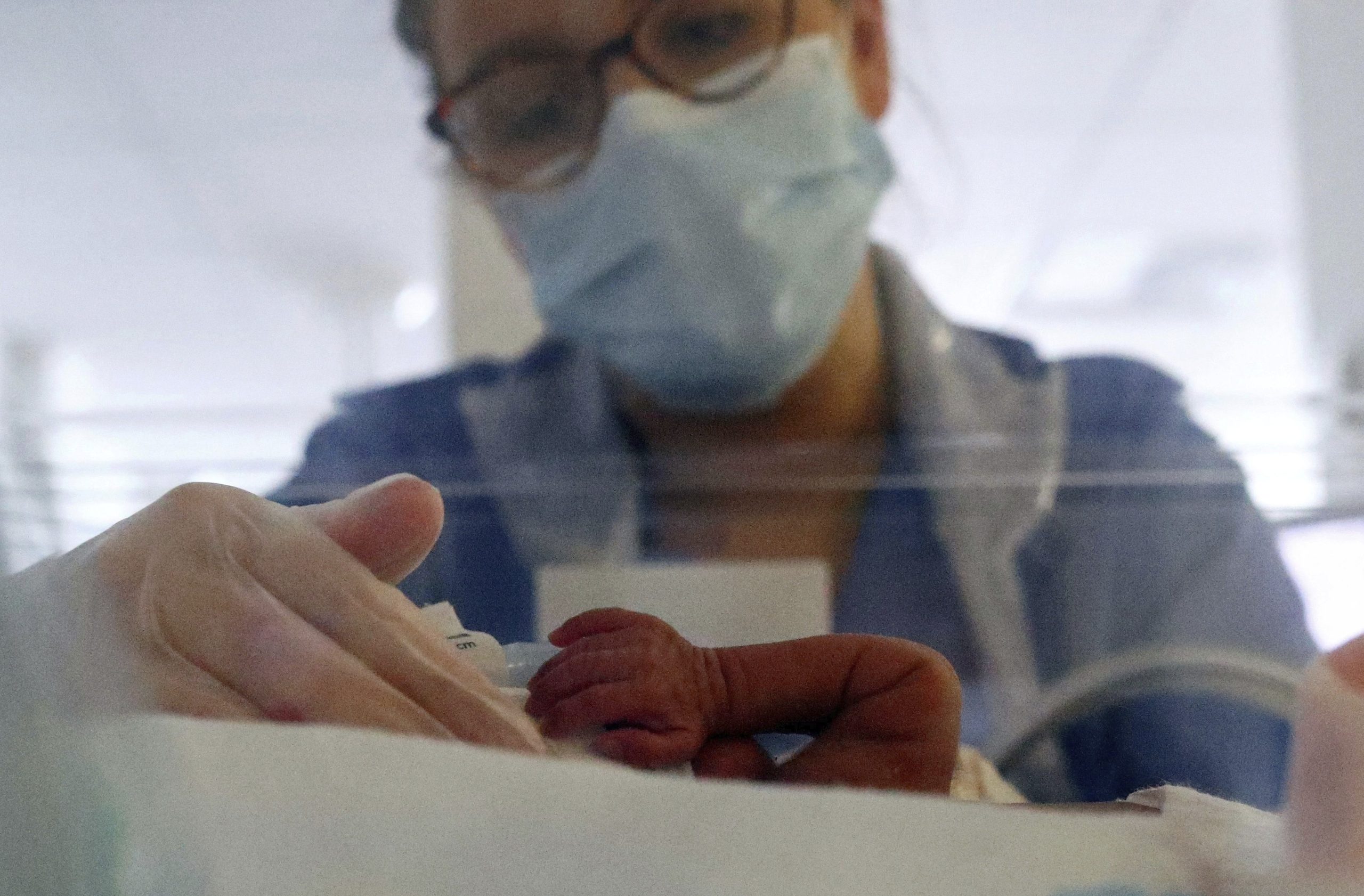Mississippi Today
Rural Delta counties have highest infant mortality rates in state, new report shows

Every region in Mississippi ranked higher in infant mortality than the national average of 5.4 deaths per 1,000 live births, according to the state’s 2021 Mississippi Infant Mortality Report released last week.
This report comes one month after the Centers for Disease Control and Prevention released data showing that Mississippi’s infant mortality rate reached a five-year high while the national rate remained relatively stable from 2020 to 2021. That report also showed that the state continues to lead the nation in babies who die before their first birthday.
In 2021, 327 Mississippi babies died before the age of one, according to the state’s report.
The leading causes of infant death in Mississippi are prematurity, low birthweight, birth defects and Sudden Infant Death Syndrome (SIDS). Babies whose deaths were caused by SIDS also reached a 10-year high in Mississippi in 2021, the report said.
“Mississippi also has the highest premature birth rate in the nation, and this drives our high infant mortality rate,” said Dr. Anita Henderson, a pediatrician and past president of the Mississippi chapter of the American Academy of Pediatrics. “We encourage all moms to get in to see their OBs in their first trimester for optimal prenatal care.”
While deliveries of babies with very low birthweight (defined as less than 3.3 pounds) decreased from 2020 to 2021, most infant deaths in the state still occurred in infants born with very low birthweight, according to the report. The statistic is more dire for Black babies, who saw three times as many deaths due to prematurity and very low birthweight than their white counterparts in 2021.
Henderson said lack of access to health care in Mississippi is contributing to high rates of prematurity and infant mortality.
“Presumptive eligibility for moms on Medicaid would facilitate timely access to prenatal care for that critical, first trimester OB visit. Over half of the counties in Mississippi do not have an OB or a delivering hospital,” she said.
Pregnancy presumptive eligibility, which Mississippi does not have, allows women to receive care during pregnancy, even if they’re not on Medicaid. Providers can enroll their pregnant patients and start billing Medicaid, which reimburses them without delays or questions.
The new report also detailed each county's average infant mortality rate over a 10-year period, showing that only two counties – Rankin and Smith – met the national recommendation of no more than five infant deaths per 1,000 live births. The other 80 counties were above that recommendation, with 31 counties seeing at least twice the recommended rate.
The three counties with the highest 10-year averages were rural counties in the Delta. Issaquena County had the highest rate in the state at 18.7 infant deaths per 1,000 births. Humphreys and Quitman counties were the other two, with rates of 16.9 and 15.8, respectively.
Following the closure of the only neonatal intensive care unit in the Delta, in addition to a labor and delivery unit at a Greenwood hospital, State Health Officer Dr. Dan Edney announced at a July Board of Health meeting a proposal for an “OB system of care,” which would model itself after other systems of care in Mississippi.
“We’re losing too many babies in transfer,” Edney recently said to a legislative committee. The proposed system would evacuate high-risk pregnant women in rural areas to either Children’s of Mississippi in Jackson or out of state.
When asked for updates about how the system of care would work, including what states Mississippi would model its system on, officials with the Mississippi Department of Health did not respond by the time of publication.
Edney was also not available to comment on the latest report, though he said in September the numbers are “extremely concerning.”
Infant morbidity, which the report defines as “any condition that adversely impacts the ability of newborns to survive and thrive,” highlights numerous racial and socioeconomic disparities.
Twice as many Black women as white women in Mississippi are diagnosed with preexisting hypertension, one of the leading causes of infant and maternal morbidity and mortality.
The report referenced a study from the American College of Obstetricians and Gynecologists that found that pregnant women on Medicaid have an increased risk of complications and poor fetal outcomes when compared to women on private insurance. That is significant in Mississippi, where, according to the report, “an estimated 22,633 deliveries are from women who have Medicaid insurance” – nearly two-thirds of the 35,156 live births that occurred in the state in 2021.
This article first appeared on Mississippi Today and is republished here under a Creative Commons license.
Did you miss our previous article...
https://www.biloxinewsevents.com/?p=296971
Mississippi Today
On this day in 1947, Jackie Robinson broke MLB color barrier
April 15, 1947

Jackie Robinson broke through the color barrier in Major League Baseball, becoming the first Black player in the 20th century.
Born in Cairo, Georgia, Robinson lettered in four sports at UCLA – football, basketball, baseball and track. After time in the military, he played for the Kansas City Monarchs in the Negro Leagues. After his success there, Dodgers general manager Branch Rickey signed Robinson, and the legendary baseball player started for Montreal, where he integrated the International League.
In addition to his Hall of Fame career, he was active in the civil rights movement and became the first Black TV analyst in Major League Baseball and the first Black vice president of a major American corporation.
In recognition of his achievements, Robinson was posthumously awarded the Presidential Medal of Freedom and the Congressional Gold Medal.
Major League Baseball retired his number “42,” which became the title of the movie about his breakthrough.
Ken Burns’ four-hour documentary reveals that Robinson did more than just break the color barrier — he became a leader for equal rights for all Americans.
This article first appeared on Mississippi Today and is republished here under a Creative Commons Attribution-NoDerivatives 4.0 International License.![]()
Mississippi Today
Mississippians highlight Black Maternal Health Week
Advocates and health care leaders joined lawmakers Monday morning at the Capitol to recognize Black Maternal Health Week, which started Friday.
The group was highlighting the racial disparities that persist in the delivery room, with Black women three times more likely to die of a pregnancy-related cause than white women.
“The bond between a mother and her baby is worth protecting,” said Cassandra Welchlin, executive director of the Mississippi Black Women’s Roundtable.
Rep. Timaka James-Jones, D-Belzoni, spoke about her niece Harmony, who suffered from preeclampsia and died on the side of the road in 2021 along with her unborn baby, three miles from the closest hospital in Yazoo City.
“It’s utterly important that stories are shared – but realize these are not just stories. This is real life,” she said.
The tragedy inspired James-Jones to become a lawmaker. She says she is working on gaining support to appropriate the funds needed to build a standalone emergency room in Belzoni.
But it isn’t just emergency medical care that’s lacking for some mothers. Mental health conditions are a leading cause of pregnancy-related deaths, defined as deaths up to one year postpartum from associated causes.
And more than 80% of pregnancy-related deaths are deemed preventable – making the issue ripe for policy change, advocates said.
“About 20 years ago, I was almost a statistic,” said Lauren Jones, a mother who founded Mom.Me, a nonprofit seeking to normalize the struggles of motherhood through community support. “I contemplated taking my life, I severely suffered from postpartum depression … None of my physicians told me that the head is connected to the body while pregnant.”
With studies showing “mounting disparities” in women’s health across the United States – and Mississippi scoring among the worst overall – more action is needed to halt and reverse the inequities, those at the press conference said.
The Mississippi Legislature passed four bills related to maternal health between 2018 and 2023, according to a study by researchers at the University of Mississippi Medical Center.
“How many times are we going to have to come before committees like this to share the statistics before the statistics become a solution?” Jones asked.
A bill that would require health care providers to offer postpartum depression screenings to mothers is pending approval from the governor.
Rep. Zakiya Summers, D-Jackson, the organizer of the press conference, commended the Legislature for passing presumptive eligibility for pregnant women this year. The policy will allow women to receive health care covered by Medicaid as soon as they find out they are pregnant – even if their Medicaid application is still pending. It was spearheaded by Rep. Missy McGee, R-Hattiesburg.
Summers also thanked Rep. Kevin Felsher, R-Biloxi, for pushing paid parental leave for state employees through the finish line this year.
Speakers emphasized the importance of focusing Black Maternal Health Week not just on mitigating deaths but on celebrating one of life’s most vulnerable and meaningful events.
“Black Maternal Health Week is a celebration of life, since Black women don’t often get those opportunities to celebrate,” said Nakeitra Burse, executive director of Six Dimensions, a minority women-owned public health research agency. “We go into our labor and delivery and pregnancy with fear – of the unknown, fear of how we’ll be taken care of, and just overall uncertainty about the outcomes.”
This article first appeared on Mississippi Today and is republished here under a Creative Commons Attribution-NoDerivatives 4.0 International License.![]()
Mississippi Today
Trump to appoint two Northern District MS judges after Aycock takes senior status
President Donald Trump can now appoint two new judges to the federal bench in the Northern District of Mississippi.
U.S. District Judge Sharion Aycock announced recently that she was taking senior status effective April 15. This means she will still hear cases as a judge but will have a reduced caseload.
“I have been so fortunate during my entire legal career,” Aycock said in a statement. “As one of only a few women graduating in my law school class, I had the chance to break ground for the female practitioner.”
A native of Itawamba County, Aycock graduated from Tremont High School and Mississippi State University. She received her law degree from Mississippi College, where she graduated second in her class.
Throughout her legal career, she blazed many trails for women practicing law and female jurists. She began her career as a judge when she was elected as a Mississippi Circuit Court judge in northeast Mississippi in 2002, the first woman ever elected to that judicial district.
She held that position until President George W. Bush in 2007 appointed her to the federal bench. After the U.S. Senate unanimously confirmed her, she became the first woman confirmed to the federal judiciary in Mississippi.
This makes Aycock the second judge to take senior status in four years. U.S. District Judge Michael Mills announced in 2021 that he was taking senior status, but the U.S. Senate still has not confirmed someone to replace him.
President Joe Biden appointed state prosecutor Scott Colom to fill Mills’ vacancy in 2023. U.S. Sen. Roger Wicker approved Colom’s appointment, but U.S. Sen. Cindy Hyde-Smith blocked his confirmation through a practice known as “blue slips,” where senators can block the confirmation of judicial appointees in their home state.
This means President Trump will now have the opportunity to appoint two federal judges to lifetime appointments to the Northern District. U.S. District Judge Debra Brown will soon be the only active federal judge serving in the district. Aycock, Mills, and U.S. District Judge Glen Davidson will all be senior-status judges.
Federal district judges provide crucial work to the federal courts through presiding over major criminal and civil trials and applying rulings from the U.S. Supreme Court and the U.S. Court of Appeals in the local districts.
This article first appeared on Mississippi Today and is republished here under a Creative Commons Attribution-NoDerivatives 4.0 International License.![]()
-

 News from the South - Arkansas News Feed7 days ago
News from the South - Arkansas News Feed7 days agoArkansas State Police launches new phone-free campaign
-

 News from the South - Missouri News Feed7 days ago
News from the South - Missouri News Feed7 days agoLocals react to Cara Spencer winning mayoral race
-

 News from the South - Arkansas News Feed5 days ago
News from the South - Arkansas News Feed5 days agoMeasles cases confirmed in Arkansas children after travel exposure
-

 News from the South - Missouri News Feed6 days ago
News from the South - Missouri News Feed6 days agoSleeping 14-year-old critically injured by bullet in Ferguson home; father flees scene
-

 News from the South - Alabama News Feed5 days ago
News from the South - Alabama News Feed5 days agoImpacts of Overdraft Fees | April 11, 2025 | News 19 at 10 p.m.
-

 News from the South - North Carolina News Feed6 days ago
News from the South - North Carolina News Feed6 days agoTax Day of April 15 is essentially May 1 in North Carolina | North Carolina
-

 News from the South - Texas News Feed6 days ago
News from the South - Texas News Feed6 days agoKSAT's Patty Santos speaks with Poteet Strawberry Festival court members, organization VP
-

 Mississippi Today5 days ago
Mississippi Today5 days agoA self-proclaimed ‘loose electron’ journeys through Jackson’s political class





















































